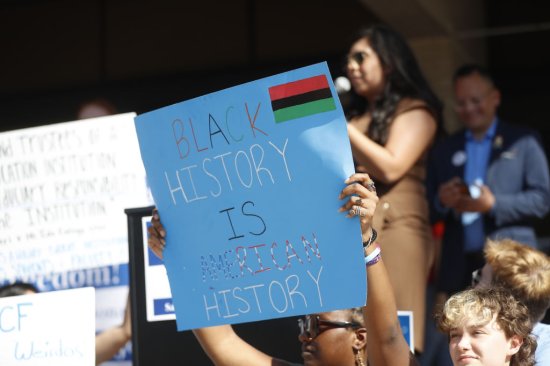
Florida's guidelines say slaves developed skills they could use for their "benefit." DeSantis says the language is similar to the College Board's.
Florida’s new social studies educational standards have drawn national scrutiny from academics and politicians alike, particularly the state’s revised language around how skills enslaved people learned could be used for their “benefit.”
The language has been attacked by Florida Gov. Ron DeSantis’ opponents in the 2024 presidential campaign on both sides of the aisle, including the Democratic Vice President Kamala Harris and Tim Scott of South Carolina, the only Black Republican U.S. Senator.
The most controversial line in the guidelines, approved July 19, says: “Instruction includes how slaves developed skills which, in some instances, could be applied for their personal benefit.”
[time-brightcove not-tgx=”true”]Yet DeSantis’ team pointed out that Florida’s language sounds similar to a section of the College Board’s AP African American Studies class framework. (The same class, in fact, that DeSantis had threatened to ban in his state.) “In addition to agricultural work, enslaved people learned specialized trades and worked as painters, carpenters, tailors, musicians, and healers in the North and South,” the College Board’s framework reads. After they were freed, the framework continues, African Americans “used these skills to provide for themselves and others.”
More From TIME
In a statement to TIME, the College Board said: “We resolutely disagree with the notion that enslavement was in any way a beneficial, productive, or useful experience for African Americans. Unequivocally, slavery was an atrocity that cannot be justified by examples of African Americans’ agency and resistance during their enslavement.” The current class framework does include “a discussion about the skills enslaved people brought with them that enslavers exploited as well as other skills developed in America that were valuable to their enslavers,” emphasizing that enslaved Africans “used those skills to survive, build community, and create culture in resistance to their oppression.”
While the concept of discussing enslaved people’s skill sets in a classroom setting is broadly accepted, scholars who contributed to the AP African American Studies curriculum tell TIME that the use of the phrase “personal benefit” is the main problem with the Florida standards.
Greg Carr, a historian at Howard University who contributed to the AP African American Studies framework, says, “To say that there’s a benefit is absurd. There’s no benefit to enslavement.” What the Florida standards do not underline, he says, is that enslaved people “are trying to use their talents, their skills, their memory, their culture to resist, in ways big and small.” Daina Ramey Berry, a historian at University of California, Santa Barbara, who also contributed to the AP African American Studies framework, says teachers must talk about “freedom in Africa” to emphasize that “before being captured and sold into slavery, African people came from highly civilized societies with a variety of skills.”
DeSantis’ campaign did not respond to a request for comment. DeSantis said Thursday that the guidelines are “very clear about the injustices of slavery in vivid detail” and mentioned similarities to the College Board’s course.
State standards are guidelines for teachers. School districts will use them to develop their own curricula, but teachers are supposed to use them as a jumping off point and add more context. As Carr puts it, “It’s not like people take the state curriculum into the classroom with them every day and follow chapter and verse like it’s the Bible.”
Florida’s new standards drew controversy within days of being approved. Vice President Harris slammed the section as “propaganda” and “lies” in a July 21 speech in Jacksonville, Florida. Sen. Scott said Thursday, “There is no silver lining… in slavery.”